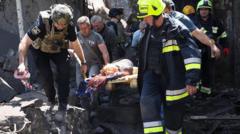As residents of Mariupol continue to deny Russian claims of normalcy, the devastation from the siege remains evident. Many live in ruins, face severe water and medicine shortages, and witness distorted educational curricula, fostering a climate of fear and resistance against occupation.
Reality in Mariupol: Residents Reject Russian Claims of Normalcy

Reality in Mariupol: Residents Reject Russian Claims of Normalcy
Despite Russian assertions of recovery, Mariupol's residents paint a starkly different picture of life in the occupied city, revealing ongoing crises.
Ukrainian residents are adamant that Russian claims regarding the restoration of Mariupol are far from the truth. "What they showcase on Russian media is fiction," states John, a local resident who spoke under a pseudonym due to fears of reprisals from the authorities. He described the ongoing devastation, "They focus on the facades of main streets for the cameras, but beyond that, it’s nothing but rubble." Since the Russian occupation began over three years ago, following a brutal siege that left thousands dead and damaged around 90% of buildings, the reality has been grim.
Recent narratives propagated by pro-Russian influencers suggest a façade of a thriving city, yet interviews with displaced residents reveal a starkly different scenario. "We once had a lovely city; now it’s full of decay,” shared Olha Onyshko, who now lives in Ternopil after escaping Mariupol. She emphasized that only a few buildings in the square were reconstructed while much of the destruction remains unaddressed.
Water shortages plague Mariupol, with residents like James reporting intermittent supply and murky water unfit for consumption. "The color resembles Coca-Cola; it’s frightening to drink," he stated, underscoring the health risks faced by the remaining population.
Residents also contend with power outages, escalated living costs, and scarce medical supplies. James mentioned the difficulties diabetics face in acquiring insulin, often at exorbitant prices. Attempts to gather insights were met with silence from Russian officials.
The education landscape has also drastically shifted, with Ukrainian children subjected to pro-Russian propaganda in schools, as described by Andrii Kozhushyna, who fled to Dnipro after witnessing the brainwashing firsthand. "Textbooks indicate many Ukrainian regions as part of Russia, and teachers are pressured to follow this curriculum," he reported. Such educational practices have reintroduced Soviet-era traditions that Ukraine had previously moved past.
Despite constant adversity, a silent resistance thrives. John and James engage in clandestine activities to support Ukrainian forces, sharing intelligence regarding military movements and attempting sabotage against Russian operations. "Our mission is to keep the spirit of resistance alive," emphasized James, who documents military activities at significant personal risk.
Living in such dire conditions has resulted in pervasive anxiety among the city's residents. John recounted the fear of being monitored, describing a near-arrest of a neighbor who was suspected of communicating with Ukrainian forces. " Life feels like a tense drama, fraught with fear and distrust daily,” he expressed.
As discussions around potential peace negotiations continue, there is a growing concern among Mariupol's residents that concessions to Russia could betray their sacrifices. John asserts, "We refuse to accept 'peace at any cost.' Our struggle is for true liberation."




















